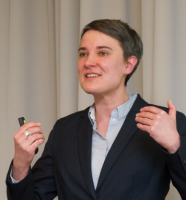Business & Corporate Responsibility
Societal Challenges
Gender Equality & Inclusion
Discrimination & Human Rights
Entrepreneurship, Social Innovation & Impact Ventures
Employment, Workplace Culture & Corporate Environment
AXA Chairs
France
Breaking down the barriers to women’s leadership and entrepreneurship
Did you know that when they are poorly designed, gender diversity programs for managers can cause a backlash? Or that more developed countries tend to have lower shares of female entrepreneurship?
Despite the millions of dollars spent each year by firms on diversity plans, women in leadership positions are still lacking. In 2018, just 24 female CEOs led the companies on the Fortune 500 list. In startup environments in particular, women leaders face discrimination and biases. Alarmed by this stagnating phenomenon, and even downturn, Sciences Po Paris and its Entrepreneurship Centre created the Women in Business Chair. The goal of this new research and teaching chair, co-funded by the AXA Research Fund, is to implement interventions to reduce discrimination, the impact of stereotypes and biases, as well as other barriers to women’s leadership and entrepreneurship.
The idea behind the project sprung from a discussion I had with Maxime Marzin, the head of the Center for Entrepreneurship at Sciences Po, recounts economist Dr Anne Boring, holder of the Chair. He was telling me about the fact that only about a third of the applications for his start-up incubator emanates from women. And thus, even though 50% of the students attending the introductory course in entrepreneurship each year are women, whose results are just as good as men. We both wanted to understand why, so we went to Stanford University, where research is state-of-the-art in this field. We found out they didn’t really have an answer either. That’s when we realized the necessity of a research program about women in the start-up environment, and more generally in leadership positions.
Looking beyond appearances and biases to produce effective solutions
The research program Anne Boring and Maxime Marzin initiated consists in three strands: research, teaching and knowledge dissemination. So far, three research projects have started, to try and answer the following questions: what types of skills are women encouraged to adopt in the workplace to reach leadership positions? Are women learning the skills that will matter in the future? What are the specificities and constraints that women entrepreneurs face? These projects fall within the framework of two overarching research objectives: to conduct a review of the main reasons why there are few women in entrepreneurship and in leadership positions and to work on getting a better understanding of the skills that would be necessary for women to acquire at the higher education level. The Chair’s findings will be fed into the creation of training courses, at Sciences Po, of course, but also in other universities and contexts. The results, as well as the training material, will be disseminated as much as possible, notably through the creation of a dedicated website.
As Dr Boring remarks, "some of the advice that is presently given to women is not based on actual research. Recommendations can be based on biases or clichés that aren’t true. For instance, people tend to think the reason why women don’t have the same working and payment conditions as men is because they don’t negotiate. Thus, one common advice they are given is to learn to negotiate. However, a recent study showed that when women try it, they can be perceived negatively and thus sanctioned. Social and environmental norms complicate things. We need to change the idea that it’s women’s fault if they don’t get equal treatment."
Start-ups, particularly in the Tech industry, are redefining the labor market of the future. But in places like America’s Silicon Valley, women are grossly underrepresented, in the order of 10%. Such observations call for urgent action. The comprehensive and large-scale research program led by Dr Anne Boring aims to provide unprecedented insight into the obstacles to gender equality still rampant in our societies. "My personal hope is that the Chair will succeed in capturing the information that we lack and that we need to enable women to unleash their true potential, the head of the chair summarizes. We aim to train women to be prepared for the obstacles that they will encounter, teach them to react in a way that will defuse the discrimination they are likely to encounter. This way, we can give them the means to show that they are just as competent as men, and to obtain the positions and the salaries they deserve. We also want to help organizations reduce the impact of biases and discrimination in the workplace. "

Anne
BORING
Institution
Sciences Po
Country
France
Nationality
French
Related articles
Societal Challenges
Artificial Intelligence & Emerging Technologies
Civil Society & Governance
Polarization & Social Divides
Ethical AI & Responsible Innovation
Post-Doctoral Fellowship
Hong Kong
Impact of Misinformation & Mistrust on Environmental Issues & Democracy: A Comparative Study
Environmental disasters and the way information about them is shared can affect how well democracy works and how people get... Read more

Minos Athanasios
KARYOTAKIS





